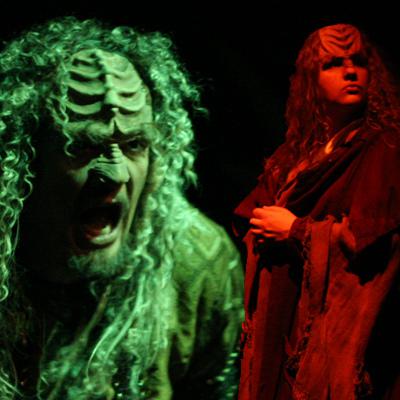This month sees the release of From Elvish to Klingon: Exploring Invented Languages, a new collection edited by English professor Michael Adams. The timing would seem to be perfect: Invented languages have received a wave of attention lately, most notably in The New York Times. As fans of invented languages ourselves, we asked Adams to teach us how these constructed languages can get us into the holiday spirit.
Some of the most famous invented languages belong to Tolkien’s Elves, Star Trek’s Klingons, Avatar’s Na’vi, and the rabbits in Richard Adams’ Watership Down. They tend to hail from fantasy, and both the languages and their native worlds are more than a little exotic. During the holiday season, though, we should focus not on what divides us, but on what Klingons, Elves, talking rabbits, and we humans have in common.
It’s reassuring that our languages—natural and invented—share some holiday-appropriate vocabulary, so here are five words or phrases that prove, in spite of our differences, that the holiday spirit is universal. If we can imagine Klingons, Elves, rabbits, Na’vi, and the Whos down in Whoville clasping hands and joining together in a rousing chorus of “Fahoo fores, dahoo dores,” there may be some holiday hope for the rest of us.
1. Katir tha Maem
This phrase is a literal translation of ‘Festival of Lights’ or ‘Chanukkah’ into Wardwesân, the language of the fictional civilization of the Wards. Like the Ancient Hebrews, the Wards formed a monotheistic culture, and their own revolts, legends, and religious writings are collected in Frédéric Werst’s recent anthology titled Ward.
Of course, the Wards knew nothing of the Maccabean Revolt or rededication of the Second Temple, and they had no term for the Jewish holiday, but the vocabulary and grammar of Wardwesân allows us to construct one. Even Channukah comes from a language that is partially constructed: The form Chanukkah (as opposed to Hanukkah) is preferred in Modern Hebrew, a language that has been revitalized to fortify Jewish and Israeli identity, and reinforced with new vocabulary to make it suitable for modern life.
2. Ele
The basic item el from J. R. R. Tolkien’s Elvish languages means ‘star’ and it underlies compound forms like Elbereth ‘star queen,’ the name of one of the principal divinities of Tolkien’s mythology, and Elerrina ‘star-crowned,’ the name of the mountain—tallest in the Blessed Realm—where she lives. It is also the base of ele ‘behold,’ which is what Elves exclaimed when they first saw stars. Behold! figures in other stories with important stars, as when the angel of the Lord said unto the shepherds, “Fear not! For, behold, I bring you good tidings of great joy, which shall be to all people.” Looking to the heavens for truth and inspiration crosses cultures—both real and fictional—and transcends their differences.
3. Roj
The history of yet another supposedly ancient people, the Klingons, is full of war and treachery, even more so than that of the Wards or Israelites. Klingons are culturally harsh and unforgiving, and so is their language. Marc Okrand, who has invented almost all of Klingon, admits to emphasizing hard and guttural sounds (k as in back, ch as in Bach, etc.) in the Klingon repertoire, so that language and culture would fit hand in glove. Still, Klingons welcome peace, if it doesn’t come at the expense of honor, and they have a word—roj—which means both ‘peace’ and ‘make peace.’ This Klingon peace, the peace that isn’t war, isn’t quite the same as the peace in “Let There Be Peace on Earth,” but it’s headed in the right direction. If Klingons value any kind of peace, then we can hope in the face of cynicism.
4. Espero
Ludwig Lazarus Zamenhof, who invented Esperanto, the most successful of international auxiliary languages, came from 19th-century Poland, when it was a hotbed of ethnic hostility. Zamenhof attributed the hostility to “the diversity of languages,” which seemed to him “the only, or at least the primary force which divides the human family into enemy parts.” He longed for nothing more than that people would live in peace, and he believed they needed a common language to do so—so he invented one, which he called “Lingvo Internacia.” He presented it to the public in 1887 under the pseudonym Doktor Esperanto—in Esperanto, esperanto means ‘one who hopes,’ and it was soon adopted as the name of the language. Zamenhof’s idealism (which many have mocked) partakes of the holiday spirit—the spirit of espero, meaning ‘hope.’
5. Hau ‘oli makaluki hau!
Hawaiian, like Modern Hebrew, is a revitalized language, partly reconstructed to work in the modern world while retaining its cultural value. Hawaiian has already given us a famous holiday phrase: Mele kalikimaka, which means ‘Merry Christmas’ and was popularized in a song written by R. Alex Anderson and famously performed by the likes of Bing Crosby, Jimmy Buffett, and Bette Midler. Mele kalikimaka is just Merry Christmas pronounced in Hawaiian, which lacks r and s. (According to Roy Zimmerman’s song, “Christmas on Mars,” Merry Christmas in Martian ends up as Eenie Kaveenie Klibidavac, so Martian apparently has the same phonetic problem.) Mele Kalikimaki (the phrase, not the song) first appeared in print in 1904, well ahead of Hawaiian language revitalization, but Hau ‘oli makaluki hau! or ‘Happy New Year!’ is part of the invented language.
However familiar or exotic we may seem to one another—Elves, Klingons, Wards, Esperantists, Hawaiians, Whos, Martians, and the rest of us—our languages are nonetheless included in the thesaurus of holiday goodwill. Happy Holidays!
